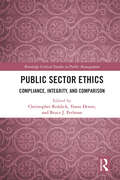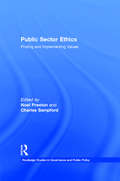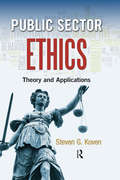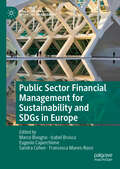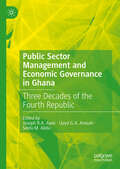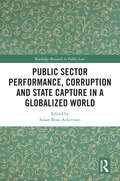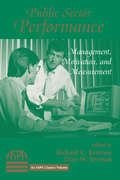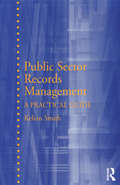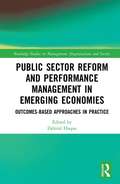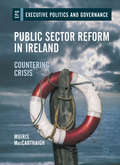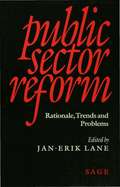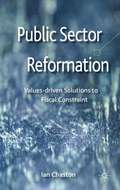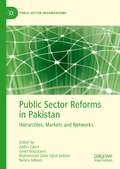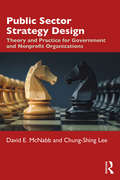- Table View
- List View
Public Sector Ethics: Compliance, Integrity, and Comparison (Routledge Critical Studies in Public Management)
by Christopher Reddick Tansu Demir Bruce J. PerlmanPublic Sector Ethics: Compliance, Integrity, and Comparison presents a comprehensive treatment of the subject of ethics in the public sector. What structural elements are necessary and how to create organizations that make ethics their priority are the questions that this edited book addresses. It focuses on ethics management in public organizations and includes national case studies from select low- to middle-income countries.Taken together, the chapters in this book cover the mechanisms, activities, and approaches that public organizations employ in ethics management. These are of utmost importance because the actions of public organizations affect citizens’ lives, liberties, and property, and their ethical character affects citizens’ faith in government. Numerous factors are at play in each instance of ethics management in public organizations, and controlling ethical behavior is difficult. This book suggests that effective ethics management requires a comprehensive approach. Traditional approaches such as ethics codes, policies and legislation, training, incentives, sanctions, monitoring, and compliance reviews are tools to achieve ethical conformity. Yet, they are effective only if leadership, values, and cultural transformation support them. This edited volume is a cohesive treatment of the subject, covering traditional approaches to ethics management, such as monitoring and compliance, and more contemporary approaches, like integrity building through ethical leadership and organizational values, as well as how to skillfully and effectively combine them to change organizational ethical contexts.This book exposes readers to new approaches and emerging issues in public sector ethics, aids in understanding the challenges of creating ethical organizations, and helps to develop a deeper understanding of ethics management in government organizations. It will be of interest to researchers, academics, and advanced students in the fields of business ethics, public administration and management, leadership, and organizational studies.
Public Sector Ethics: Finding and Implementing Values (Routledge Studies in Governance and Public Policy #Vol. 1)
by Charles Sampford Noel Preston C-A BoisThis study, with contributions from both scholars and practitioners, examines the theory and practice of public sector ethics across a broad range of environments.
Public Sector Ethics: Theory and Applications
by Steven G. KovenIn a down-to-earth review of the often-contentious subject of ethics, Public Sector Ethics: Theory and Applications presents personal accounts of individuals who faced moral dilemmas and how they resolved them. It moves the study of ethics away from a box checking exercise of what to do/not to do to a discussion that creates understanding of existe
Public Sector Financial Management for Sustainability and SDGs in Europe (Public Sector Financial Management)
by Isabel Brusca Eugenio Caperchione Sandra Cohen Francesca Manes-Rossi Marco BisognoThis book analyses the implications of sustainability on public financial management in Europe. Public sector entities at national, regional, and municipal levels all have an important role to play in achieving sustainable development, and are developing strategies to reach this goal. These plans are usually guided by the UN's Sustainable Development Goals and involve public financial management systems, which are adapting to the demanding requirements of meeting these challenges. This book investigates how public financial management systems have been influenced by requirements for sustainability in Europe. It assesses multiple aspects linked to public financial management, including budgeting, accounting, reporting, and auditing. It also considers the impact of the SDGs on accounting systems, as well as other issues related to sustainability, such as green budgeting, gender budgeting, and sustainability and environmental reporting. By providing a cross-country comparison, it aims to identify similarities and differences across Europe. The book will appeal to scholars and students of public policy and financial management, as well as those interested in sustainability and the SDGs.
Public Sector Management
by Norman Flynn Alberto AsquerIn an era marked by unprecedented challenges, from the climate crisis to the rise of populism, the ways to manage public sector organisations have dramatically changed. In the eighth edition of this bestselling textbook, Flynn and Asquer offer the definitive introduction to public administration. Now substantially revised and updated throughout, this text reflects the latest approaches, tools and techniques that help governments respond to the multifaceted problems facing societies today and pre-empt those of tomorrow. Recognising the importance of context, Public Sector Managementunderscores that one-size-fits-all management practices are inadequate. Learn how public sector management adapts to changing political climates and societal pressures and be guided through the intricacies of making evidence-based policies while acknowledging the political dynamics that shape them. Updates to the eighth edition include: · A Global Perspective: Explore variations in public sector management shaped by cultural, historical, and institutional contexts, and gain a deep understanding of how governments address challenges in unique ways. · Balancing Theory and Practice: the new edition offers amore detailed and holistic perspective on public sector management by bringing in the latest theoretical insights and real-world public sector management practices. · Adapting to Change and tacking today’s issues: Confront the challenges faced in the age of technology, from artificial intelligence to Big Data; the climate crisis and clean energy transitions; and resulting from the latest geopolitical shifts including workforce migration to the erosion of trust in democracies. · A Call for Contextual Understanding: Learn how factors such as heterogeneity, population, income inequality, and technological access influence public sector management practices. Public Sector Management is essential reading for upper undergraduate and postgraduate students studying public sector management or public administration and is perfect for those studying on a Master of Public Administration programme. Norman Flynn was Director of the Centre for Financial and Management Studies, SOAS, University of London and Programme Director of the MSc in Public Policy and Management. Alberto Asquer is Head of the School of Finance and Management, Programme Director, MSc Public Policy and Management, and Senior Lecturer of Public Policy and Management at SOAS University of London
Public Sector Management
by Norman Flynn Alberto AsquerIn an era marked by unprecedented challenges, from the climate crisis to the rise of populism, the ways to manage public sector organisations have dramatically changed. In the eighth edition of this bestselling textbook, Flynn and Asquer offer the definitive introduction to public administration. Now substantially revised and updated throughout, this text reflects the latest approaches, tools and techniques that help governments respond to the multifaceted problems facing societies today and pre-empt those of tomorrow. Recognising the importance of context, Public Sector Managementunderscores that one-size-fits-all management practices are inadequate. Learn how public sector management adapts to changing political climates and societal pressures and be guided through the intricacies of making evidence-based policies while acknowledging the political dynamics that shape them. Updates to the eighth edition include: · A Global Perspective: Explore variations in public sector management shaped by cultural, historical, and institutional contexts, and gain a deep understanding of how governments address challenges in unique ways. · Balancing Theory and Practice: the new edition offers amore detailed and holistic perspective on public sector management by bringing in the latest theoretical insights and real-world public sector management practices. · Adapting to Change and tacking today’s issues: Confront the challenges faced in the age of technology, from artificial intelligence to Big Data; the climate crisis and clean energy transitions; and resulting from the latest geopolitical shifts including workforce migration to the erosion of trust in democracies. · A Call for Contextual Understanding: Learn how factors such as heterogeneity, population, income inequality, and technological access influence public sector management practices. Public Sector Management is essential reading for upper undergraduate and postgraduate students studying public sector management or public administration and is perfect for those studying on a Master of Public Administration programme. Norman Flynn was Director of the Centre for Financial and Management Studies, SOAS, University of London and Programme Director of the MSc in Public Policy and Management. Alberto Asquer is Head of the School of Finance and Management, Programme Director, MSc Public Policy and Management, and Senior Lecturer of Public Policy and Management at SOAS University of London
Public Sector Management
by Norman Flynn Dr Alberto AsquerThe seventh edition of the bestselling Public Sector Management is a rich and insightful description, analysis and critique of the management of the public sector by the UK government. NEW to the seventh edition: Now set in an international context with comparative global examples throughout Three new chapters covering: strategy and planning in the public sector; transparency, accountability and ethics; and non-profit management, including the role of social enterprise and the voluntary sector Examines the impact of the continuing financial crisis on public spending An updated companion website with tutorial videos, free access to full-text journal articles, policy documents, links to useful websites and social media resources: https://study.sagepub.com/flynn7 Public Sector Management is essential reading for undergraduate and postgraduate students studying public sector management as part of a business, management or politics degree.
Public Sector Management
by Norman Flynn Dr Alberto AsquerThe seventh edition of the bestselling Public Sector Management is a rich and insightful description, analysis and critique of the management of the public sector by the UK government. NEW to the seventh edition: Now set in an international context with comparative global examples throughout Three new chapters covering: strategy and planning in the public sector; transparency, accountability and ethics; and non-profit management, including the role of social enterprise and the voluntary sector Examines the impact of the continuing financial crisis on public spending An updated companion website with tutorial videos, free access to full-text journal articles, policy documents, links to useful websites and social media resources: https://study.sagepub.com/flynn7 Public Sector Management is essential reading for undergraduate and postgraduate students studying public sector management as part of a business, management or politics degree.
Public Sector Management
by Norman FlynnThe highly-anticipated sixth edition of Norman Flynn's Public Sector Management continues to provide students with an insightful, jargon-free description, analysis and critique of the management of the public sector by the UK government. New to the sixth edition: * Fully updated to take account of the coalition government and the impact of the financial crisis on public spending. * Four new chapters on managing public finance, e-government, regulation and public-private partnerships. * Expanded learning features including:, additional boxed examples, annotated suggestions for further reading and suggestions for discussion topics and references to journal articles. * New companion website with free access to full-text journal articles, policy documents, links to useful websites, and relevant multimedia and social media resources. www.sagepub.co.uk/flynn6 Public Sector Management will prove invaluable reading for students studying public sector management as part of a business, management, social policy, politics or sociology degree.
Public Sector Management and Economic Governance in Ghana: Three Decades of the Fourth Republic
by Joseph R. A. Ayee Lloyd G. A. Amoah Seidu M. AliduThis book is one of two volumes that examines the successes and failures of the Ghanaian Fourth Republic from a political, public administration, and public policy viewpoint. Published to coincide with the thirtieth anniversary of the founding of the Fourth Republic, these volumes bring together leading scholars to consider the political achievements and failures that have taken place in the country since 1993, and what these tell us about the state of politics and democracy in twenty-first century Ghana and beyond. This volume focuses on public sector management and economic governance. It assesses themes such as policy elites, policing, bureaucrats and public servants, the economy, decentralization, rural development, and foreign policy. The volume also places Ghana in a global context, demonstrating how lessons learnt from the country can be applied elsewhere, and what is unique about the Ghanaian experience. It will appeal to all those interested in public management, public administration, governance, economics, and African politics.
Public Sector Marketing Communications Volume I: Public Relations and Brand Communication Perspectives (Palgrave Studies of Public Sector Management in Africa)
by Ogechi Adeola Kojo Kakra Twum Paul KatuseAfrican nations are seeking ways to build strong institutions that are development-oriented and people-centred. Extant literature has reported the negative consequences of ineffective government communications with the public. In response, this book — the first of a two-volume edited work — focuses on marketing communication themes related to branding, public relations, trade fairs and exhibitions, and public sector communications. Public sector marketing communication plays a crucial role in bridging the gap between society and the government. Building a relationship with the public through appropriate communication tools and platforms is sacrosanct to restoring public sector image and trust. The book supports this effort by sharing conceptual and theoretical research towards the marketisation of Africa’s public sector as it strives to become an effective partner with the public it serves. Together with the second volume, which focuses on traditional and digital perspectives, this collection fills an existing information gap that is evident in Africa’s public sector.
Public Sector Marketing Communications, Volume II: Traditional and Digital Perspectives (Palgrave Studies of Public Sector Management in Africa)
by Ogechi Adeola Kojo Kakra Twum Paul KatuseBuilding public sector image and trust in Africa requires judicious use of appropriate marketing communications tools and platforms. Contributing authors to this second volume of a two-volume work offer insights into how the selection and strategic utilisation of marketing tools will facilitate interactions between the government and the citizens, improve inter-governmental and inter-agency collaboration, and boost a citizen-oriented public sector. Traditional marketing communications tools continue to play a key role in citizen and public sector relationships; however, given mega-trends of demographic change, urbanisation, and digitalisation in Africa, it is important to consider how public institutions, including government agencies, local government, universities, and football associations, respond and adapt to these changes. The digital revolution presents an opportunity for public sector institutions to align their communication plans with new technologies, particularly leveraging social media platforms.Together with the first volume, which focuses on public relations and brand communication perspectives, this collection fills an existing information gap evident in Africa’s public sector literature. The text serves as a decision making, teaching, and learning guide for practitioners, faculty, and students interested in applying marketing principles and practices to the public sector.
Public Sector Performance and Development Cooperation in Rwanda
by Stephan Klingebiel Victoria Gonsior Franziska Jakobs Miriam NikitkaThis study provides a conceptual framework for analysing results-based approaches to improving public sector effectiveness and efficiency according to their actor constellation and shared characteristics. Though there is consensus regarding the importance of functioning public sector agencies and organizations for sustainable development, public sector reform efforts have historically only had modest success. Results-based approaches aim at improving public sector performance through the establishment of reward modalities on domestic as well as international levels, and the authors of this work evaluate the potential of these approaches to provide an entry point for development cooperation. Applying their framework to empirical data obtained from fieldwork in Rwanda, they analyse the main domestic performance approach - Imhigo - and suggest how the system might be strengthened.
Public Sector Performance, Corruption and State Capture in a Globalized World (Routledge Research in Public Law)
by Susan Rose-AckermanThis collection examines the difficult task of reforming governments worldwide to meet citizens’ needs and aspirations. It advances constructive efforts to enhance public accountability while recognizing the complex ways in which corruption, greed, and state capture undermine the legitimacy and performance of government. The contributors are political scientists, lawyers, and economists who bring a cross-disciplinary approach to their chosen subjects. The first group of chapters deals with public sector performance, development, and public participation. Complementary pieces by a practitioner and a scholar confront the challenges of achieving reform in countries with difficult political environments and extensive poverty and inequality. The second group emphasizes the way corruption and state capture limit the accountability and effectiveness of governments in both developing and wealthy countries. The contributions consider the institutional roots of dysfunctional government and their links to the private sector. Taken together, the volume surveys a wide range of topics with theoretical arguments and empirical findings that provide insights into real-world problems and policymaking dilemmas. Inspired by Susan Rose-Ackerman’s fifty-year exploration of public policymaking, public law, and corruption, the collection will be an invaluable resource for researchers, academics and policy makers working in the areas of Public Law, Anticorruption, and Political-Economy.
Public Sector Performance: Management, Motivation, And Measurement (Aspa Classics Ser.)
by Richard KearneyConfronted with rising citizen discontent, the Reinventing Government movement, and new technological challenges, public organizations everywhere are seeking means of improving their performance. Their quest is not new, rather, the concern with improving the performance of government organizations has existed since the Scientific Management Movement. Public Sector Performance brings together in a single volume the classic, enduring principles and processes that have defined the field of public sector performance, as written in the words of leading practitioners and scholars. Taken as a whole, this volume provides a performance compass for today's public managers, helping them to reconstruct the public's confidence in, and support of, government.Defined here as managing public organizations for outcomes, performance is examined in all its varied dimensions: organizing work, managing workers, measuring performance, and overcoming resistance to performance-enhancing innovations. The selected articles are interesting, thought provoking, and instructive. They are classics in that they have been widely cited in the scholarly literature and have enduring value to public managers who seek to understand the many dimensions of performance. The book is organized into three sections: Performance Foundations, Performance Strategies, and Performance Measurement. Excerpts from additional selected articles feature special topics and wisdom from performance experts.
Public Sector Records Management: A Practical Guide
by Kelvin SmithRecords management has undergone significant change in recent years, owing to the introduction of freedom of information legislation as well as the development of e-government and e-business and the need to manage records effectively in both the private and public sector. There are very few purely practical texts for records managers and this book aims to fill that gap. The author has spent his entire career in public sector records management and has contributed to records management standards for governments around the world. The text is wholly practical and written at an accessible level. Although the author discusses legislation and examples from the UK, the book is relevant to public sector records management at an international level. It will be essential reading for professionals in record management posts as well as anyone who is responsible for record keeping as part of their operational duties.
Public Sector Reform and Performance Management in Emerging Economies: Outcomes-Based Approaches in Practice (Routledge Studies in Management, Organizations and Society)
by Zahirul HoqueIn the recent decade, governments worldwide are increasingly focusing on being community-centric and outcomes-based. Consequently, they are starting to move towards outcomes-based approaches to public financial management systems. An outcomes-based approach allows government service agencies and specific program areas to organize and communicate priorities to achieve what matters and makes a difference rather than just going through the motions. Empirical evidence on how government agencies in emerging economies go about this contemporary approach and issues affecting these practices is limited. This edited collection of chapters is aimed at covering public sector reform and performance management in emerging economies with special reference to outcomes-based approaches in practice in government services. Practices from developed economies contained in the first book on the topic have been published by Routledge in February 2021. The insights offered on the topic are written by renowned scholars who have identified important issues pertinent to those interested in public sector governance, accounting, accountability, and performance management effectiveness in emerging economies. The book will be highly accessible to researchers, academics, and students in the fields of accounting, public administration, development studies, and other non-accounting audiences alike.
Public Sector Reform in Ireland
by Muiris MaccarthaighThis book provides a thematic case-study analysis of the wide-ranging public sector reforms introduced in one of the states most deeply affected by the global financial crisis: the Republic of Ireland. It presents a timely and apposite examination of how a crisis can be used to overcome barriers and facilitate new reform agendas. The study draws upon unique insider access to the centre of Irish government, as well as interviews with over 60 key figures, to examine the implementation of those reforms over the 2011-16 period. The book opens with a contextual analysis of the creation of the Department of Public Expenditure and Reform. Subsequent chapters explore the process of shrinking the Irish state, renegotiating the political-administrative bargain, expenditure reforms, administrative culture reforms, and political reforms. This rich 'in action' study of a reform agenda undertaken during a period of crisis will appeal not only to students of executive politics, cutback management and public sector reform, but also to practitioners seeking to implement administrative reforms.
Public Sector Reform: Rationale, Trends and Problems
by Professor Jan-Erik LaneDeregulation, privatization and marketization have become the bywords for the reforms and debates surrounding the public sector. This major book is unique in its comparative analysis of the reform experience in Western and Eastern Europe, Australia, New Zealand and Canada. Leading experts identify a number of key factors to systematically explain the similarities and differences, map common problems and together reflect on the future shape of the public sector, exploring significant themes in a lively and accessible way.
Public Sector Reformation
by Ian ChastonReductions in public sector spending mean voters will face a period of austerity, higher taxes and declining availability of public sector services. Prevailing public sector management philosophies are no longer applicable. To optimise future service provision with fewer resources will demand a reformation in organisational thinking and values.
Public Sector Reforms in Developing Countries: Paradoxes and Practices (Routledge Critical Studies in Public Management)
by Charles Conteh Ahmed Shafiqul HuqueThe underpinning assumption of public management in the developing world as a process of planned change is increasingly being recognized as unrealistic. In reality, the practice of development management is characterized by processes of mutual adjustment among individuals, agencies, and interest groups that can constrain behaviour, as well as provide incentives for collaborative action. Paradoxes inevitably emerge in policy network practice and design. The ability to manage government departments and operations has become less important than the ability to navigate the complex world of interconnected policy implementation processes. Public sector reform policies and programmes, as a consequence, are a study in the complexities of the institutional and environmental context in which these reforms are pursued. Building on theory and practice, this book argues that advancing the theoretical frontlines of development management research and practice can benefit from developing models based on innovation, collaboration and governance. The themes addressed in Public Sector Reforms in Developing Countries will enable public managers in developing countries cope in uncertain and turbulent environments as they seek optimal fits between their institutional goals and environmental contingencies.
Public Sector Reforms in Pakistan: Hierarchies, Markets and Networks (Public Sector Organizations)
by Geert Bouckaert Abiha Zahra Muhammad Zafar Iqbal Jadoon Nasira JabeenThis book provides a research-based analysis of public sector reforms in Pakistan. It offers a broad overview of reforms at different levels of government – including federal, provincial and local – and examines decentralization and devolution reforms in various policy sectors. It also reflects on market-oriented reforms and the steps taken to involve the private sector to build a better-governed public sector, and explores new trends in the public sector in the areas of digitalisation and disaster management. Bringing together young researchers, academics, and practitioners, the book sets a new milestone in the movement towards context-specific reform studies in both academia and the professional practice of public administration, particularly in South Asia.
Public Sector Revenue: Principles, Policies and Management
by Alberto AsquerIn this time of acute financial pressure on public budgets, there is an increasing interest worldwide in alternative ways for governments to raise money, and how public authorities can develop the capacity to administer revenues efficiently and effectively. Taxation, the primary source of public revenue, is exposed to various threats, while alternative sources of public revenues have much potential but are rarely carefully designed and harnessed. Public Sector Revenue: Principles, Policies and Management sets itself apart from other textbooks through its exclusive focus on the revenue side of public financial management. It provides the reader with the theoretical foundations and practical tools to understand the generation and management of revenues in the public sector, and it weaves a wide range of international examples throughout the text. Students will also benefit from a companion website with supplements including test questions and answers to the end-of-chapter discussion questions inside the book. This textbook will be essential reading for students, managers and policymakers within the areas of public financial management, public sector accounting and public administration.
Public Sector Strategy Design: Theory and Practice for Government and Nonprofit Organizations
by David E. McNabb Chung-Shing LeeWithin the public sector, strategies are not designed to influence markets, but instead to guide operations within a complex environment of multilateral power, influence, bargaining, and voting. In this book, authors David McNabb and Chung-Shingh Lee examine five frameworks public sector organization managers have followed when designing public sector strategies. Its purpose is to serve as a guide for managers and administrators of large and small public organizations and agencies. This book is the product of a combined more than sixty years of researching, teaching and leading organizational seminars on the theory and practice of management applications in industrial, commercial, nonprofit and public sector organizations. The book consists of four parts: Strategic Management and Strategy Fundamentals; Frameworks for Designing Strategies; Examples of Public Sector Strategies; and Implementing Strategic Management. Throughout, the focus is on the widespread value of strategic management and adopting the strategy appropriate for the organization. Including chapters on game theory, competitive forces, resources-based view, dynamic capabilities, and network governance, the authors demonstrate ways that real managers of public sector and civil society organizations have put strategic management to work in their organizations. This book will be of interest to both practicing and aspiring public servants.
Public Sector Strategy: Concepts, Cases and Tools
by Mark Crowder Mohammad Roohanifar Trevor A. BrownPublic Sector Strategy explores how strategic decisions are developed and implemented in the public sector, and examines the psychology underpinning strategic decision-making. Combining knowledge from traditional perspectives with contemporary insights on strategic management, this book considers how managers make their decisions and provides key concepts and practical tools to aid delivery of strategy within highly institutionalised settings. This book provides theoretical grounding, real-life global cases, and practical examples of strategic decisions in an international public-sector context by working through the underpinnings of strategy, the influencing factors of strategic decision-making, strategic implementation, and strategic tools in practice. It should be a core textbook for advanced undergraduate and postgraduate students studying public sector strategy and strategic management more broadly. It will also be of benefit for public sector managers, consultants, and private sector organisations who wish to interact with the public sector.
